6 名词性从句的译法
名词性从句的翻译
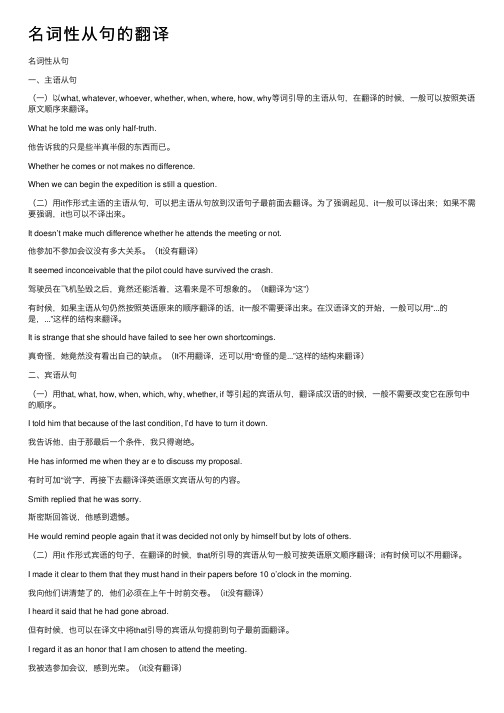
名词性从句的翻译名词性从句⼀、主语从句(⼀)以what, whatever, whoever, whether, when, where, how, why等词引导的主语从句,在翻译的时候,⼀般可以按照英语原⽂顺序来翻译。
What he told me was only half-truth.他告诉我的只是些半真半假的东西⽽已。
Whether he comes or not makes no difference.When we can begin the expedition is still a question.(⼆)⽤it作形式主语的主语从句,可以把主语从句放到汉语句⼦最前⾯去翻译。
为了强调起见,it⼀般可以译出来;如果不需要强调,it也可以不译出来。
It doesn’t make much difference whether he attends the meeting or not.他参加不参加会议没有多⼤关系。
(It没有翻译)It seemed inconceivable that the pilot could have survived the crash.驾驶员在飞机坠毁之后,竟然还能活着,这看来是不可想象的。
(It翻译为“这”)有时候,如果主语从句仍然按照英语原来的顺序翻译的话,it⼀般不需要译出来。
在汉语译⽂的开始,⼀般可以⽤“...的是,...”这样的结构来翻译。
It is strange that she should have failed to see her own shortcomings.真奇怪,她竟然没有看出⾃⼰的缺点。
(It不⽤翻译,还可以⽤“奇怪的是...”这样的结构来翻译)⼆、宾语从句(⼀)⽤that, what, how, when, which, why, whether, if 等引起的宾语从句,翻译成汉语的时候,⼀般不需要改变它在原句中的顺序。
名词性从句的翻译

名名词词性性从从句句的的翻翻译译英语名词从句包括主语从句、宾语从句、表语从句和同位语从句等。
翻译这类从句时,大多数可按原文的句序译成对应的汉语,但也还有一些其它的处理方法。
现分述如下:一、主语从句(一) 以what, whatever, whoever 等代词引导的主语从句翻译时一般可按原文顺序翻译。
1) What he told me was only half-truth.他告诉我的只是些半真半假的东西。
2) Whatever he saw and heard on his trip gave him a very deep impression.他此行所见所闻都给他留下了深刻的印象。
3) Whoever has made a voyage up the Hudson must remember the Kaatskill Mountains.凡是在哈得孙河上游航行过的人是一定记得卡兹吉尔群山的。
他告诉我的只是些半真半假的东西而已。
(二)以it 作假主语所引出的真主语从句,翻译时视情况可以提前,也可以不提前。
1. 真主语从句提前译,为了强调起见,it 一般可以译出来,如果不需要强调,it 也可以不译出来。
1)It doesn’t m ake much difference whether he attends the meeting or not . 他参加不参加会议没有多大关系。
2)It is a fact that the U .S .S .R .has sent it fleet to all parts of the world. 苏联已把它的舰队派往世界各地,这是事实。
3)It seemed inconceivable that the pilot could have survived the crash . 驾驶员在飞机坠毁之后,竟然还能活畜,这看来是不可想象的。
2.真主语从句不提前,it 一般不需要译出来。
句子翻译 (2)

宾语从句的译法
(1) 翻译宾语从句一般都用顺译法 • I can’t make out what they are talking about. 我不清楚他们在谈什么。 • He was not conscious of what an important discovery he had made. 他没意识到他的这一发现多么重要。 • We are certain that we’ll be able to accomplish the designing in a short period of time. 我们肯定能在短期内完成这项设计。
(2) 用倒译法将同位语从句译为前置修饰语 • There was little probability that they would succeed. 他们成功的可能性极小。 (3) 用转换法将同位语从句转译为汉语的复合 结构作宾语 • This thought came to him that maybe he had left his keys in the bedroom. 他突然想起可能把钥匙忘在卧室里了。
同位语从句的译法
(1) 用顺译法将同位语从句译为汉语的独立句,并根 据具体情况在前面加冒号、破折号或加“即”等 表同位关系的词 • Then arose the question where we were to get the materials needed. 于是就产生了这样一个问题:我们到哪里去找所需 要的材料。 • The name “volcano” indicates the belief of the ancient Greeks that the burning hills of the Mediterranean were the workshops of divine blacksmith, Vulcan. “火山”这一名称表明古希腊人的这一信念,即地中 海沿岸燃烧着的山是锻冶之神“伍尔坎”的工场。
英语八大从句类型例句
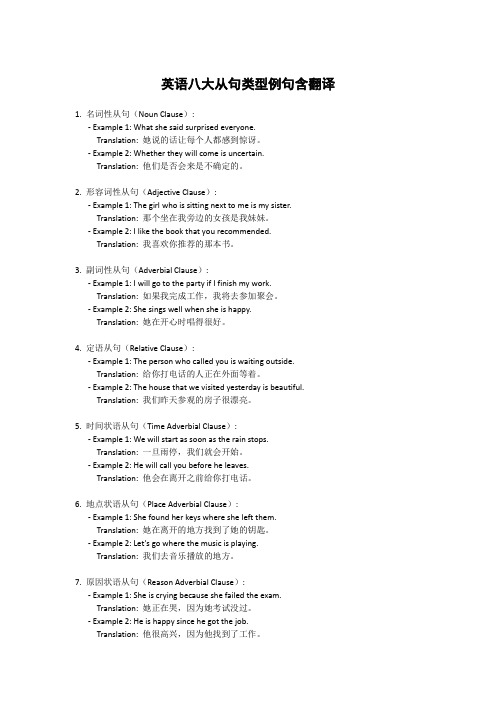
英语八大从句类型例句含翻译1. 名词性从句(Noun Clause):- Example 1: What she said surprised everyone.Translation: 她说的话让每个人都感到惊讶。
- Example 2: Whether they will come is uncertain.Translation: 他们是否会来是不确定的。
2. 形容词性从句(Adjective Clause):- Example 1: The girl who is sitting next to me is my sister.Translation: 那个坐在我旁边的女孩是我妹妹。
- Example 2: I like the book that you recommended.Translation: 我喜欢你推荐的那本书。
3. 副词性从句(Adverbial Clause):- Example 1: I will go to the party if I finish my work.Translation: 如果我完成工作,我将去参加聚会。
- Example 2: She sings well when she is happy.Translation: 她在开心时唱得很好。
4. 定语从句(Relative Clause):- Example 1: The person who called you is waiting outside.Translation: 给你打电话的人正在外面等着。
- Example 2: The house that we visited yesterday is beautiful.Translation: 我们昨天参观的房子很漂亮。
5. 时间状语从句(Time Adverbial Clause):- Example 1: We will start as soon as the rain stops.Translation: 一旦雨停,我们就会开始。
考研英语翻译之名词性从句的翻译

Whether an organism is a plant or an animal sometimes taxes the brains of a biologist.
一种生物是植物还是动物,有时使生物学家很伤脑筋。
When it was first invented is not known.
众所周知,物体在水中比在空气中轻。
It is no longer a question whether man can fly to the moon.
人能否飞上月球,现在已不再是什么问题了。
It is certain that we shall produce this kind of engine.
宾语从句既可以是动词的宾语,也可以是某些形容词或介词的宾语。宾语从句也可以出现在由it作形式宾语的句子中,汉译时,顺序一般不变。例如:
Scientists have long predicated that computers would one day help speed up the arduous task of translating texts.
The suggestion that we should develop the natural resources in this region has been discussed.
关于我们应该开发本地区自然资源的建议已经被讨论过了。
There is no possibility that human beings will ever be controlled by robots.
问题在于人们怎样才能找到一种有效的方式来储藏太阳热。
翻译技巧 常见句型的翻译
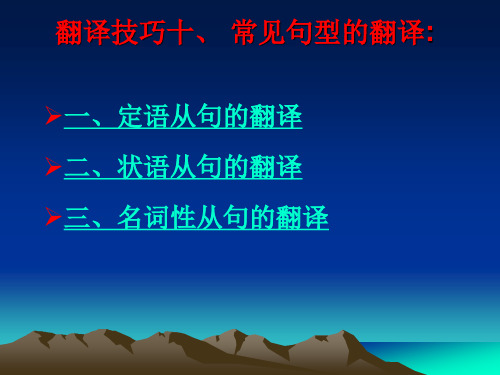
6. He liked his sister, who was warm and pleasant, but he did not like his brother, who was aloof冷漠 and arrogant高傲.
他喜欢热情愉快的妹妹,而不喜欢冷漠高傲的哥哥。
II . 译成后置定语
这是我第一次和领导发生严重纠葛。
IV. 译成状语
有些定语从句从形式上看是定语,但在意义上与主 句有逻辑状语关系,对主句其原因、结果、目的、条件、 让步等状语作用,翻译时应尽可能按照其语法功能,译 成与汉语相对应的复句。
21. The computer, which seems to play the role of a human brain, is often called an electronic brain.
据我所知, 英语里并没有这个单词。
状语从句的翻译
3. Where water resources are plentiful, hydroelectric power stations are being built in large numbers. 哪里有充足的水源,哪里就在兴建大批的水电站。 4. Wherever you work, you must always serve the
unfair.
他把一切错误都归罪于我,我认为这很不公平。
12. These books, which are only a small part of my
collection, I picked up in American.
这些书是我在美国买,它们在我的藏书中只占一小部
分。
13. She was very patient towards the children,
名词性从句翻译
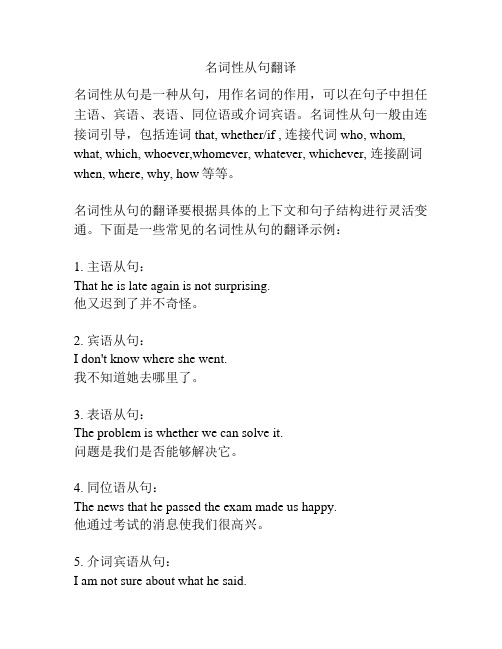
名词性从句翻译名词性从句是一种从句,用作名词的作用,可以在句子中担任主语、宾语、表语、同位语或介词宾语。
名词性从句一般由连接词引导,包括连词that, whether/if , 连接代词who, whom, what, which, whoever,whomever, whatever, whichever, 连接副词when, where, why, how等等。
名词性从句的翻译要根据具体的上下文和句子结构进行灵活变通。
下面是一些常见的名词性从句的翻译示例:1. 主语从句:That he is late again is not surprising.他又迟到了并不奇怪。
2. 宾语从句:I don't know where she went.我不知道她去哪里了。
3. 表语从句:The problem is whether we can solve it.问题是我们是否能够解决它。
4. 同位语从句:The news that he passed the exam made us happy.他通过考试的消息使我们很高兴。
5. 介词宾语从句:I am not sure about what he said.我不确定他说的是什么。
6. 间接引导名词性从句:He asked where I lived.他问我住在哪里。
7. 是否从句:I wonder whether/if she will come to the party.我想知道她是否会来参加派对。
8. 选择性从句:He asked me whether I preferred coffee or tea.他问我是喜欢咖啡还是茶。
9. 宾语从句(陈述句变为疑问句):Do you know what time it is?你知道现在几点钟吗?10. 宾语从句(连接代词):I wonder who is going to pick us up at the airport.我想知道谁会在机场接我们。
英语从句翻译方法

英语从句翻译方法-CAL-FENGHAI.-(YICAI)-Company One1英语从句翻译方法英语多从句,汉语多分句:就句子类型而言,英语句子不仅可以在简单句中使用很长的修饰语使句子变长,同时也可以用从句使句子变复杂,而这些从句往往通过从句引导词与主句或其它从句连接,整个句子尽管表面上看错综复杂却是一个整体。
汉语本来就喜欢用短句,加上表达结构相对松散,因此,英译汉时需要将各种英语从句进行处理,可以译成一个汉语单句,也可译成多个汉语分句。
并按照汉语的表达习惯对英语复合句的关联部分(从句引导词)加以逻辑梳理,既分而叙之,又上关下联,承接转换,犹如整容。
一名词性从句的译法名词性从句包括主语从句、宾语从句、表语从句和同位语从句。
下面我们便逐一论述这些名词性从句的翻译方法。
1. 主语从句1) 由what, whatever, whoever等代词引导的主语从句汉译时一般可按原文顺序翻译。
例如:What he said is true.译文:他说的一切都是真的。
Whoever violates the disciplines should be criticized.译文:谁违犯了纪律,谁就应该受到批评。
2) 由it作形式主语引导的主语从句,翻译时视情况可以提前,也可以不提前。
例如:It doesn't make much difference whether you come yourself or send a substitute.译文:你是自己来还是派代理人来,都无关紧要。
(提前)It seemed inconceivable that the pilot could have survived the crash.译文:驾驶员在飞机坠毁之后竟然还活着,这看来是不可想象的。
(提前)It is strange that she should have failed to see her own shortcomings.译文:这奇怪,她竟然没有看出自己的缺点。
名词性从句的翻译

1.表语从句一般可按原文翻译 Row material is what we are in need of. 原料是我们所需要的东西。 This is why she got in touch with us in the first place. 这是她起初和我们接触的原因。
IV. 同位语和同位语从句
*两种结构 Who kept the door open all night was unknown. 从句位于句首 It‘s a pity that you should go so soon. 从句位原文顺序翻译 What he told me was only half-truth. 他告诉我的只是半真半假的东西而已。 That he finished writing the composition in such a short time surprised us all. 他竟然在这么短的时间内完成作文,令我们很惊 讶。 When we start the work is an important question. 我们什么时候开始工作,这是个很重要的问题。
名词性从句的翻译
Translation of Substantive Clauses
什么是名词性从句? What has happened is no surprise to us. We all know well enough what he is. This is why we don’t like him. The fact that I left him is expectable. 主语从句、宾语从句、表语从句、同位语从句
1.同位语单词和短语的翻译 They two have the same idea. 他们两个都有这种想法。 According to Bill Johns, my doctor, this disease is easy to cure. 根据我的医生比尔的观点,这种疾病很容易治愈。 The negotiation will take place at a hotel, the (可用破折号——) Friendship Hotel. 谈判将在一个宾馆内举行——友谊宾馆。
英语从句的翻译

One cannot read a book without learning something.
开卷有益
2. 定语从句的翻译
• 英语的定语从句,有时起修饰、限制作 用,有时起补充说明的作用,在逻辑上则 可以表示原因、条件、目的、结果等意义。 • 汉语的定语通常放在修饰的名词之前, 而且不宜过长。因此,与汉语相比,英语 的定语从句结构相对复杂,其译法也多种 多样。
• (1)这个方案有创造性, 而且别出心裁,又有 魄力,所以深得他们的喜欢。(原因状语) • There was something original, independent and heroic about the plan that pleased all of them.
• (2)我们必须给机器的可动部件加油,以 便大大减少摩擦。(目的状语) • We have to oil the moving parts of the machine , the friction of which may be greatly reduced.
• (2)中国有浅海、滩涂总面积约1,333万公顷, 按现在的科学水平, 可进行人工养殖的水面有 260万公顷。(并列分句) • 浅海shallow seas • 滩涂tidelands • 公顷ha • 水产品aquatic products • The shallow seas and tidelands have a total area of 13.33 million ha, of which 2.6 million ha of water surface are suitable for the raising of aquatic products in terms of the current scientific level.
名词性从句的译法

目 录
• 名词性从句的概述 • 名词性从句的翻译技巧 • 名词性从句在句子中的位置和功能 • 名词性从句的特殊译法 • 名词性从句在汉译英中的应用
01
名词性从句的概述
定义与分类
定义
名词性从句是句子在复合句中充当名 词成分,包括主语、宾语、表语和同 位语等。
分类
根据功能和意义,名词性从句可以分 为陈述性从句、疑问性从句和祈使性 从句。
主语从句
主语从句在句子中充当主语,表达句子 的核心信息。
在翻译时,通常将主语从句放在句首,以突 出其重要性。
例如:When he comes back is unknown. 他什么时候回来还不知 道。(主语从句翻译为“什么时候 他回来还不知道”)
宾语从句
01
宾语从句在句子中充当宾语,对句子的主语进行补 充说明。
详细描述
合句法是指将多个简单句合并成一个长句,使译文更加 紧凑、连贯。这种方法通常用于翻译多个简单句构成的 长句,如“She is beautiful, and that is why he likes her.”可合句译为“她很漂亮,这就是他喜欢她的原因。 ”
03
名词性从句在句子中的 位置和功能
要点二
详细描述
分句法是指将复杂的名词性从句拆分成多个简单句,使译 文更加清晰、易于理解。这种方法通常用于翻译包含多个 从句或修饰语的名词性从句,如“What I like is the way she talks.”可分句译为“我喜欢的是她说话的方式。”
合句法
总结词
将多个简单句合并成一个长句,增强整体感。
在翻译过程中,要保持原文的语义完整性和通顺度,避免出现歧义和语病。同时,要注意符合目标语 言的表达习惯和规范。
高考英语复习名词性从句的翻译

名词性从句的翻译英语的名词性从句包括主语从句、宾语从句、表语从句和同位语从句。
翻译的时候,大多数可以按照原文的句子顺序翻译成相应的汉语译文。
但有时候也需要采用其他翻译方法来灵活处理。
一、主语从句1)以关联词what, whatever, whoever, when, where, how, why或从属连词that, whether等词引导的主语从句,一般可以按照英文原句的顺序来翻译,即一般放在句首,作为主从复合句的主语。
例如:What he told me was a sheer lie.他对我说的全是谎言。
Whatever I saw and heard on my trip left me a very deep impression.一路上的所见所闻给我留下了深刻的印象。
Whoever has made a trip to Huangshan must remember the clouds there.凡是去过黄山的人都不会忘记黄山的云。
Whether an organism is a plant or an animal sometimes taxes the brain of a biologist.一种生物究竟是植物还是动物,有时会让生物学家颇伤脑筋。
2) 对于it作形式主语的主语从句,可以先译主句,顺译为无人称句。
有时也可先译从句,再译主句,这样的话,一般需要在主句前加译“这”。
需要注意的是,如果强调it,可以将其译出;如果不需要强调,也可不译。
例如:It is strange that she should have failed to see her own shortcomings.真奇怪,她竟然看不出自己的缺点。
It seemed incredible that she should have lied to us.她居然对我们说谎,这真是不可思议。
It doesn’t make much difference to me whether you come or not.你来不来我不在乎。
名词性从句翻译ppt课件
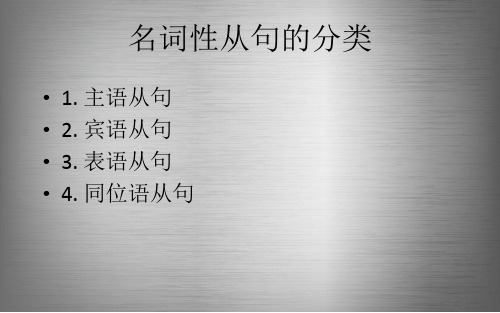
表语从句
• 引导表语从句的连词与引导主语从句的连 词相同。表语从句一般采用顺译法,即先 译主语后译从句。
Example
• The trouble was they couldn’t agree among themselves.
• 问题是他们内部意见都不能统一。
• 他将辞职的传言是假的。
• It does not alter the fact that he was responsible for the delay.
• 迟延应由他负责,这个事实是改变不了的。
• 3. 转换译法。
• 被同位语所说明的本位语,如若是包含着有动作 意义的词,如discovery, suggestion, hope, assurance, knowledge等,一般可把这类词转化为 动词,将同位语从句译为汉语的主谓词组,做该 动词的宾语。
• 近来谁也没有见过他,这一情况令办公室 所有的人不安。
• That he is still alive is sheer luck. • 他还活着全靠运气。
• It is quite clear that the whole project is doomed to failure.
• 很清楚,整个计划注定要失败。
增加泛指性词语作主语
• It is admitted that • It is asserted that • It is believed that • It is found out that • It is known that • It is pointed that • It is regarded that • It is suggested that • It is thought that
6.分句合句法,名词从句,被动语态的译法

It is generally accepted that the experiences of the child in his first years largely determine his character and later personality.
人们普遍认为,孩子们的早年经 人们普遍认为,
2. 合句法 1)把原文中两个或两个以上的简 )把原文中两个或两个以上的简 两个或两个 单句( 单句(simple sentence)译成一 ) 个单句。 个单句。
He was very clean. His mind was open.
他为人单纯而坦率。 他为人单纯而坦率。
His father had a small business in the city of Pisa. This city is in the north of Italy near the sea.
对于英语原文的被动结构, 对于英语原文的被动结构 我们一般采 取下列的方法: 取下列的方法 1.翻译成汉语的主动句。英语原文的被 翻译成汉语的主动句。 翻译成汉语的主动句 动结构翻译成汉语的主动结构又可以 进一步分为ห้องสมุดไป่ตู้种不同的情况。 进一步分为几种不同的情况。 (1) 英语原文中的主语在译文中仍做 主语。 主语。 在采用此方法时, 在采用此方法时 我们往往在译文中使 加以” 经过 经过” 用 用了 “加以”, “经过”, “用……来” 来 等词来体现原文中的被动含义。 等词来体现原文中的被动含义。
Mr. Billings cannot be deterred from his plan. (人们 不能阻止比林斯先生实 人们)不能阻止比林斯先生实 人们 行他的计划
另外, 另外 下列的结构也可以通过这一手段 翻译: 翻译 It is asserted that … 有人主张 It is believed that … 有人认为 有人认为…… It is generally considered that … 大家(一般人 一般人)认为 大家 一般人 认为 It is well known that … 大家知道 (众所周知 众所周知)…… 众所周知 It will be said … 有人会说 有人会说…… It was told that … 有人曾经说 有人曾经说…
名词性从句的翻译

“It is + 形容词+that 从句”
译法:先将“that从句”单独翻译出来,然后加上 “(这是)很+形容词”的结构。 有时将形容词转译成副词短语,会使译文更符合汉语 的表达习惯。
1.It was really astonishing that she refused to talk to her parents. A.她拒绝和父母交谈,这真令人吃惊。 B. 我们很可能要迟到一会儿。 2. It is strange that he should have failed to see his own shortcomings. A. 他竟然没有看出自己的缺点,这很奇怪。 B. 真奇怪,他竟然没有看出自己的缺点。
Translation of Nominal Clauses
I. Translation of Subject Clauses II. Translation of Object Clauses
III. Translation of Predicative Clauses
IV. Translation of Appositive clauses
(三)Convert into an object clause and put it after the noun.
There are clear indications that the war will soon be over. 有明显的迹象表明战争即将结束。
(四) Use punctuation marks or specific words
麻烦的是他们缺钱。 3.This is where the shoe pinches. 这就是问题的症结所在了。
IV. Appositive clauses
名词性从句的译法

It’s a pity that you missed such a fine talk.
真遗憾,这样好的报告你没听到。
It is a sheer waste of time that we read such kink of trash.
阅读这样的垃圾图书简直就是浪费时间。
It +被动语态+that从句
名词性从句的译法
名词性从句
主语从句 宾语从句 表语从句 同位语从句
主语从句的译法
“that + 从句的主语+从句的谓语+主句 的谓语” 译法:可以将“that从句”单独译成一 句,加逗号,再使用“这”字作主语 的句子。 “that”在句中只起连接作用,可省去 不翻。
例:
That the living conditions are improving is evident. 生活条件在改善,这很明显。 That the pilot could have survived the crash seemed inconceivable.
例:
It is an accepte fact that the climate around the world is changing.
世界各地的气候都在变化,这是人所共知 的事实。
相当于: That the climate around the world is changing is an accepted fact.
It is my suggestion that everybody should be there by seven o’clock. 我建议所有的人必须七点钟到达那里。
英语名词性从句汉译英之顺译法浅析

英语名词性从句汉译英之顺译法浅析英语名词性从句汉译英之顺译法浅析很多同学在翻译从句时,就直接按照汉语的字面意思来翻译,结果翻译得不理想。
首先我们来看一个句子:他说的是真的,结果就就直接翻译为“He said is true〞。
可惜却不知道错在哪里。
在这里,在“将错就错〞的根底上,采用顺译方法。
希望通过这种方法,能在短时间内提高从句汉译英的水平。
要正确翻译出一个从句,我们先分析下从句的特点。
从句由“从〞和“句〞构成,“从〞意味着要有一个连词,连词的作用是连接句子,更重要的是,连词还要在从句中充当一定的成分。
“句〞意味着从句是一个陈述句。
而学生在翻译的过程中,先不说生词的问题,最容易出错的地方也就是从句局部。
我们先看看英语中名词性从句的连词种类,分为连接代词:what,which,who,whom,whose,在从句中做主语,宾语,表语和定语;连接副词:how,when,where,why,在从句中做状语;附属连词:that,whether,在从句中不充当任何成分,只起到连接作用。
所以“He said is true〞缺少了一个连词。
接下来,我们分别举例,分析主语从句、宾语从句、表语从句和同位语从句的翻译技巧和方法。
首先我们看一个主语从句,“我们是否去爬山取决于明天的天气〞。
分析出这个句子的主语是“我们是否爬山〞,谓语是“取决于〞,宾语是“明天的天气〞。
按照翻译步骤,先在句首划一条横线“〞,“我们是否爬山〞翻译为“we will climb the mountain〞,“取决于〞翻译为“depend on〞,“明天的天气〞翻译为“tomorrow’sweather〞,连成一句话后,变成“wewill climbthemountai‘n depend on tomorrow’s weather〞。
主语从句的结构“we〞是主语,“will climb〞是谓语,其宾语是“themountain〞,即主语从句的主谓宾都全了,需要在横线的位置填上一个连词,起到连接作用,并根据汉语原句中的“是否〞,可以判断出横线上应该填上“Whether〞,根据从句作主语,谓语用单数的原那么,最终的译文为“Whetherwe will climb the mountain depends on tomorrow’sweather〞。
- 1、下载文档前请自行甄别文档内容的完整性,平台不提供额外的编辑、内容补充、找答案等附加服务。
- 2、"仅部分预览"的文档,不可在线预览部分如存在完整性等问题,可反馈申请退款(可完整预览的文档不适用该条件!)。
- 3、如文档侵犯您的权益,请联系客服反馈,我们会尽快为您处理(人工客服工作时间:9:00-18:30)。
主语从句译法 What
the students find most difficult
in English is its idiomatic usage.
学生感到,
英语最困难的地方是
它的习惯用法。
主语从句译法 Whether
he comes or not makes no
difference.
through the crisis of his illness. 我担心他是否能渡过疾病的危险期。
Smith
replied that he was sorry.
史密斯回答说,他感到遗憾。
宾语从句翻译 用 it 作形式宾语的句子,汉译时
that引起的宾语从句一般可按照原 文顺序,it不译。 I take it for granted that you will come and talk the matter over with him. 我想你会来跟他谈这件事的。
whtever;whoever;whichever;
when; where; how; why;
宾语从句翻译 宾语从句翻译顺序可顺可逆,比较
灵活,具体视情况确定。
Can
you hear what I say?
你听得到我所讲的吗?
宾语从句翻译 I
worry about whether he can pass
主语从句译法
It is quite obvious that the girl still loves you deeply. It is an honor that I was invited to attend your marry ceremony.
很明显,这个女孩依然深爱着你。
很荣幸,被邀请参加你的婚礼。
why;whether; whoever; whatever; whichever;
主语从句译法 T h a t
he finished writing the
composition in such a short time
surprised us all.
他在这么短的时间内写完一篇作文
使我们都感到惊讶。
was how a small nation won
the victory over a big power.
这就是小国如何战胜大国的。
就这样,小国战胜了大国。
同位语从句翻译 英语的同位语从句是用以解释说
明前面某一名词的内容的,也就是
将这一名词的含义具体化,其地位
和此名词是同等的。
从句常用 that 或 whether 来引导。
It
is a fact that everyone wants to have a
good job.
事实上,每个人都想有份好工作。
注意:该句是主语从句而不是同位语 从句。同位语从句应做与fact同等成分、 同等意义的成分,如: The fact that everyone wants to have a good job is true.
上世纪末有一个重要的发现,即一切
东西都有一部分是由电子构成的。
同位语从句翻译
有需要时,同位语从句也可提前:
There
can be no doubt that she is competent for this job.
她能胜任这项工作,这是毫无疑
问的。
同位语从句翻译 This
is a certainty that socialism will replace capitalism.
同位语从句与其所修饰的名词之间是一种 同位关系,二者之间存在逻辑上的系表关 系,可用“主+系+表”结构来表示。
• The news that she will go abroad is true. •她将出国这消息是真的。
The news is that she will go abroad
同位语从句翻译
德国已对俄国宣战的消息一大早
就传来了。
同位语从句翻译
将同位语从句翻译成宾语: He expressed the hope that he would come over to visit China again. 他表示希望再到中国来访问。
I had no idea that you were here.
is/was
+
名词
被动语态
+ that 从句
行为动词
补语
主语从句译法 1.真主语从句不提前,按正常语序,
it 不翻译出来:
It
is strange that she should have failed to see her own shortcomings.
真奇怪,她竟然没看出自己的缺点。
社会主义将代替资本主义,这是
必然的事。
主句在后,并用“这”重复指代主 语从句内容 It seemed unbelievable that the pilot could have survived the crash. 驾驶员在飞机坠毁之后,竟然还 能活着,这看来是不可想象的。
宾语从句翻译 宾语从句在句中作宾语,引导词为
that;who;what;which;if/whether;
主语从句译法 该种名词性从句有时需要颠倒主句
和从句顺序来使译文更加通顺,如:
It's
a sheer waste of time that we read such kind of trash.
时间。
阅读这样的垃圾图书简直就是浪费
主语从句译法 It
is+ 被动语态 +that 从句常有固 is reported that the Summit
名词性从句译法
英语名词性从句包括主语从句、宾
语从句、表语从句和同位语从句。
在翻译时,词序一般不变,但有时
也需采取一些其他处理方法。
主语从句 宾语从句
表语从句
同位语从句
主语从句译法
主语从句的位置:
1.句首
2.It(形式主语)+谓语动词+主语从句
主语从句的引导词: that;what;who;which;when;where; how;
Page35、37
页。
主语从句译法 It+行为动词+that从句 一般按正常语序译出即可,it不翻
译出来 It occurred to me that he had forgotten to lock the door. 我突然想起他忘了锁门。(课本原
句)
主语从句译法 也可拆成两部分,主语从句在前,
我不知道你也在这儿。
同位语从句翻译
将从句翻成同位语,用“即”,“这” 或者 “破折号”过渡:
At
the end of last century,an important
discovery was made that everything was built partly of electrons.
将同位语从句译成定语:
We must face the fact that we might
lose our deposit(存款).
我们必须正视我们可能会失去存 款的事实。
同位语从句翻译 Early
in the day came the news that
Germany had declare用来说明fact,theory,
sense,question,conclusion,news,
experience , evidence , proof ,
condition,law,conjecture ,doubt 等词的具体内容。
同位语从句与定语从句区别
一、修饰、形容 VS 解释、说明 1. We heard the news that he had told her. 我们听到他对她说的消息。 2. We heard the news that he had won the game. 我们听到消息他赢得了比赛。
定说法来翻译主句:
It
Meeting will be held in December.
据报道,这个峰会将在12月举行。
主语从句译法 It
is well known that knowledge is important for everyone.
众所周知,知识是非常重要的。
见课本被动结构翻译常见表达
表语从句翻译 That’s
what we should do.
这正是我们应该做的(我们的 本分)。 The question remains whether we can win the majority of the people. 问题是我们能否赢得大多数人民 群众的支持。
表语从句翻译 That
他来不来都没什么区别。
Who
will monitor the class is not decided yet.
谁当班长还没决定。
主语从句译法 Whatever
was said must be kept
secret.
这里说的每句话都应当保密。
主语从句译法
is/was
形容词
It +
is/was
宾语从句翻译 I
made it clear to them that they
must hand in their papers before 10
o’clock in the morning.
我向他们讲清楚了的,他们必须
在上午十时前交卷。
宾语从句翻译
宾语从句过长或为了强调需颠倒语 序,并作适当拆分。 We consider it absolutely necessary that we should open our door to the outside world. 打开国门,实行开放,我们认为 这是绝对必要的。
